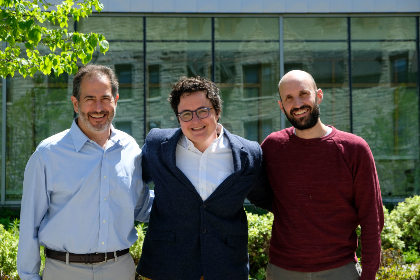Three Larner College of Medicine faculty-led, group projects have been selected to receive 2023 Frymoyer Scholars funding. The three projects focus on supporting decisions on graduated responsibility in pathology residency; creating a two-week Ob/Gyn bootcamp curriculum focused on skill-building; and developing simulation-based educational modules for high-acuity, low-occurrence patient presentations in emergency departments at critical access hospitals.

(Left to right) Jordan Ship, Laura Mulvey, and Justin DeAngelis
Teaching Academy Director Kathryn Huggett, Ph.D., and the Frymoyer Scholars Program Review Committee recently announced that three faculty-led projects were selected to receive Frymoyer Scholars funding in 2023.
The Frymoyer Scholars Program is funded through the John W. and Nan P. Frymoyer Fund for Medical Education, a philanthropic fund at UVM with a 23-year history of supporting physicians and nurses who are actively engaged in teaching medical and nursing students and who embody the best qualities of the clinician-teacher. Individuals selected as Frymoyer Scholars are awarded up to $25,000 a year for two years to develop innovative educational products or programs and/or to improve their teaching skills.
“Thoughtful projects addressing health professions education needs were submitted for consideration this year,” Huggett said. “The project teams represent the breadth of health care professionals here at the University of Vermont.”
The 2023 funded projects are:
- “Consequential Validity of Entrustable Professional Activities in Pathology Residency Training,” led by by Bronwyn Bryant, M.D., assistant professor of pathology and laboratory medicine and associate residency program director in anatomic pathology. This research will use entrustable professional activities (EPAs) to collect evidence of consequential validity to support decisions on graduated responsibility in pathology residency. EPAs are key tasks that residents can be trusted to perform, allowing supervising faculty to make competency-based decisions on the level of supervision a resident requires. EPAs support training pathology residents by setting expectations, developing a shared mental model between supervising faculty and trainee, and preparing residents for independent practice. Bryant anticipates that this work will be a stepping stone to increase resident autonomy and prepare residents for transition to independent physicians. “We are excited to partner with other programs and national organizations to make graduated responsibility a reality in pathology training,” Bryant said.
- “Turn Transition to Residency Training Courses into Academic Success Throughout Residency Using Novel Educational Techniques,” led by Justin DeAngelis, M.D., assistant professor of obstetrics, gynecology, and reproductive sciences, with collaborator Mackenzie Delzer, M.D., clinical instructor of obstetrics, gynecology, and reproductive sciences. This project aims to create a two-week Ob/Gyn bootcamp curriculum focused on skill-building for maintaining medical knowledge. It will enable residents to develop their own study tools for common Ob/Gyn topics, create questions to test their own knowledge, and reinforce this knowledge over time. An interactive smart phone app will allow residents to share with each other any infographics they create, and track their own knowledge and performance. DeAngelis envisions this curricular innovation for an Ob/Gyn bootcamp course providing a translatable set of tools that could be used for any transition-to-residency course. “Our goal is to give residents in the clinical environment the tools to develop skills in learning new material and use those skills to continue to learn and grow after medical school, into residency, and on into practice,” he said.
- “In Situ Simulation in the Critical Access Hospital,” led by Laura Mulvey, M.D., assistant professor of emergency medicine and director of evidence-based practice, with collaborators Daniel Ackil, D.O., assistant professor of emergency medicine and simulation educator; Daniel Bak, M.D., emergency medicine resident; KC Collier, M.D., emergency medicine resident; Jordan Ship, M.D., assistant professor of emergency medicine and medical director of Elizabethtown-Ticonderoga Emergency Departments; Julie Vieth, M.D., assistant professor of emergency medicine, assistant medical director of UVMMC Emergency Department, and assistant director of simulation; Ashley Weisman, M.D., assistant professor of emergency medicine and director of elective curricula; Luke Wohlford, M.D., emergency medicine resident; Bruce Barry, RN, Paramedic and Elizabethtown Community Hospital Paramedic Program director; and fourth-year medical student Rachel Bombardier. Mulvey’s team will develop simulation-based educational modules for the most common high-acuity, low-occurrence patient presentations in the emergency departments at critical access hospitals (CAHs), which provides health care services to rural, often underserved communities.. The project aims to reinforce interprofessional teamwork, identify systems issues that impede ability to provide care, and pinpoint gaps in knowledge to better improve care of critically ill patients. This educational curriculum model can be adapted at other CAHs as a curriculum of in situ simulation in a rural critical access setting. “We are looking to develop a novel simulation curriculum that can be piloted at Elizabethtown Community Hospital, and ultimately offered across all network hospitals to ensure a unified, high-quality, evidence-based approach to patient care,” Mulvey said.
Huggett expressed her gratitude to the members from the College of Nursing and Health Sciences and the Larner College of Medicine who served on the 2023 Frymoyer Review Committee for offering their valuable time and expertise to select the top three projects and provide feedback to all applicants.
Learn more about the Frymoyer Scholars Program.